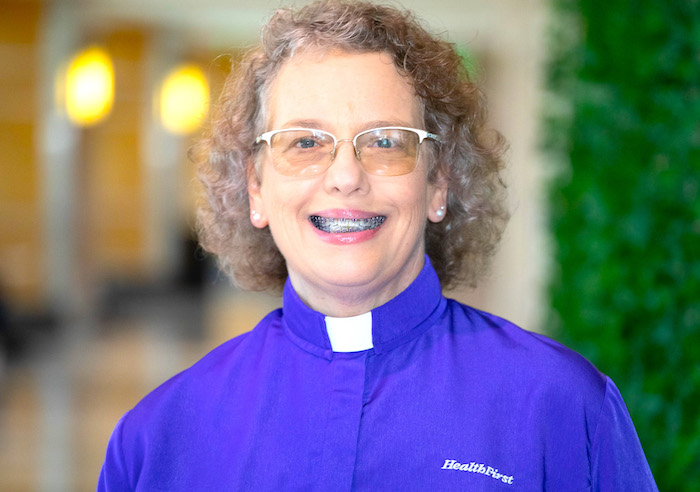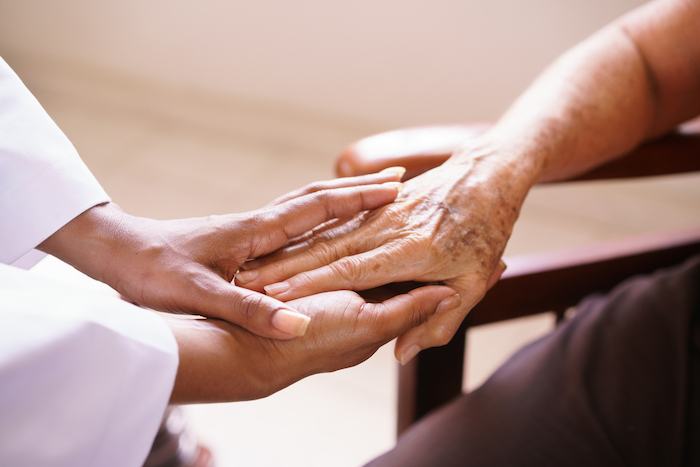REV. ELLEN WILLIAMS: I Respond to Code Blues, My Bedside Care Is for Those Left Behind
By REV. ELLEN WILLIAMS, PhD, BCC, Spiritual Care Manager at Health First // September 18, 2024
It was time for Henry’s partner to pass away. It was my job to help him let go.

Rev. Ellen Williams, PhD, BCC, is the manager of Spiritual Care at Health First
Henry was standing at the head of the bed when I entered the room, wide-eyed in the face of the organized chaos of doctors, nurses and staff responding to a Code Blue alert.
His wife, Lois, had been admitted several days earlier suffering from the complications of chronic obstructive pulmonary disease (COPD). Now, she was in full cardiac arrest.
I am Rev. Ellen Williams, PhD, BCC, the manager of Spiritual Care at Health First. One of my roles is to provide crisis care chaplaincy, mostly at Holmes Regional Medical Center, where Henry and Lois were.
Their hospital room swarmed with responders coordinating chest compressions, airbag ventilation, defibrillation shocks and intravenous stimulants. Code Blue is a hospital-wide alert. It’s high stakes, and the rush of rapid response team members can be high stress – even traumatizing – for family members witnessing their loved ones be the focus of such frenzy.
Emotional and Spiritual Support
As a crisis care chaplain, I’m a member of this rapid response team. My role is to provide emotional and spiritual support for patients, families and staff during and after a crisis event. Handholding and prayer, while important, are only part of a chaplain’s contribution to the rapid response team.
Approaching Henry, whose eyes were locked on the personal drama before him, I gently laid a hand on his forearm to get his attention without startling him.
“Hello, Henry,” I said, above the noise of the code. “I am Chaplain Ellen, here to offer support.”
Glancing briefly at me before returning his attention to his wife, Henry said, “I was talking to her a moment ago, and she seemed to be listening. She was breathing just fine, and then the alarms started going off and people came running into the room. So many people. Why did this happen?”
“I am not sure,” I replied. “That must have been really scary for you.”
“Just so unexpected…she was getting better,” Henry assured me. “Really, she was more herself. She had just asked about Bandit, our Pekingese,” his voice trailed off, choked with emotion.
I listened as Henry described the horror of watching his wife slip into cardiac arrest mid-conversation, and then ascertained that there were no family in the waiting area or on the way to the hospital. From a previous visit, I knew Lois did not practice any particular faith.
Alerted by staff that this was Lois’s third code, and her prognosis was grim, I asked Henry if he and Lois had discussed a do-not-resuscitate (DNR) order. Helping family members understand when it is time to let go is a crucial part of my role. It is spiritual but also deeply clinical. Prolonging death is often emotionally harmful – for the patient and the staff.
“They asked us about a DNR before, but I can’t just let her go,” Henry said. “She … was just talking.”
DNR orders can be requested by the patient if they are cognitively aware or by their healthcare surrogate if they are incapacitated. Henry was Lois’s healthcare surrogate.
I gently guided Henry through a discussion about Lois’s quality of life as he watched the medical team work on her.
“We were childhood sweethearts. Married 58 years,” he said.
His hope was beginning to fade when the rapid response team leader indicated to me that Lois was not going to recover. It was time to “call the Code.”
Henry’s face crumpled as the lead physician explained that the team was unable to regain a heartbeat, and that even if they did, Lois was unlikely to survive. It is often psychologically easier for the surviving spouse if they participate in the decision to stop CPR. With an arm around Henry’s slumped shoulders, I spoke to him about Lois.
“Henry, you’ve said that Lois’s health has been rapidly declining, and she has suffered a great deal over the last year or so,” I said. “What would you want Lois to do for you, if you were the patient?”
With his consent, I led an end-of-life prayer at bedside before resuscitative measures were ceased, and Lois died. I then stayed with Henry until other family members arrived to be by his side.

Selfless Team of Volunteers
As the Health First Manager of Spiritual Care, the most meaningful responsibility I have is to Henry and patients like him. Of course, many of my duties lie elsewhere. I manage the Health First community hospital chaplains in Cape Canaveral, Viera, and Palm Bay.
Our department is small but mighty. We have two full-time chaplains at Holmes and three part-time chaplains at the community hospitals who provide spiritual care for up to 1,000 patients, their families, and 10,000 Health First associates. We are assisted by a selfless team of over 100 spiritual care volunteers.
A professional chaplain is skilled in providing guidance and spiritual care to individuals of all faiths – or none at all, as it was with Lois and Henry. For those overwhelmed by the flood of emotions that accompany death, chaplains help bridge the gap between evidence-based medical care and the profound mystery of what lies beyond.
Health First’s Spiritual Care program is supported by Health First and by contributions from the Brevard County community and from Health First associates to the Health First Foundation. To consider making a gift, visit HF.org/Give, or call Chris Kern at 321.434.7353.












